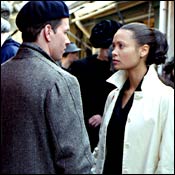
If you’ve seen Stanley Donen’s Charade, starring Cary Grant and Audrey Hepburn, you probably won’t like The Truth About Charlie, Jonathan Demme’s free-form remake starring Mark Wahlberg and Thandie Newton. On the other hand, if you haven’t seen Charade, you probably won’t like the remake, either. It’s the kind of movie usually described as a director’s holiday. Demme was obviously trying to loosen up with this film after a string of heavy-going and, for the most part, classically structured movies like The Silence of the Lambs, Philadelphia, and Beloved. In theory, at least, it’s a step in the right direction; I was beginning to think that the director of such innovative and marvelously alive movies as Citizen’s Band, Melvin and Howard, Stop Making Sense, and Something Wild had undergone what James Agee once termed rigor artis. Demme began his career making exploitation schlock for Roger Corman – Caged Heat is his signature picture from that era – and he clearly still loves the reckless, on-the-fly freedom of those microbudget days; equally, he adores the French New Wave movies that transformed his generation of moviemakers. (He includes cameos from such icons as Anna Karina and Charles Aznavour.) Both of these loves are on display in The Truth About Charlie, but the ardor never escalates into anything we can truly share. The trouble with directors’ holidays is that too often only the directors are enjoying the holiday.
The main reason to sit through Demme’s latest is for the way he shows off modern-day Paris in all its buzzing multi-ethnicity – a rarity in Hollywood movies – and for Thandie Newton, who has the Audrey Hepburn role and shares Hepburn’s impossibly delicate, alert beauty. Newton’s Regina Lampert is a wonderfully woozy creation; her sensuality makes her appear slightly blurred, as if even the camera were too intoxicated by her to focus. Regina’s rich, philandering husband of three months, whom she was planning to divorce, has been murdered, and initially the police suspect her. She’s just returned from a solo vacation in Martinique; by contrast, the Paris she reenters is perpetually overcast – another attempt by Demme to undercut City of Light clichés. Soon a swirl of crooks and confidants is bearing down on Regina in search of the millions her husband stole. Unnerved by the threats and attention, she’s also rather pleased – it’s nice to be wanted. Prominent in the swirl is Joshua Peters (Wahlberg), whom she met casually in Martinique and who now, playing her protector, seems understandably smitten. Tim Robbins also turns up as a covert American embassy official, though his dimples suggest something more sinister. None of their machinations and subterfuges are meant to carry much weight, or logic.
Nor do they carry much charm. Charade didn’t make a whole lot of sense either, but with Grant and Hepburn and Peter Stone’s deluxe dialogue, it didn’t much matter. I realize that Mark Wahlberg is not Cary Grant, but shouldn’t there be some compensating reason for his presence in this movie? He’s too vapid and callow. Demme has made Wahlberg into the anti–Cary Grant without giving him anything distinctively his own to play. When Regina says to Joshua, “You know what’s wrong with you?” and answers herself by saying, “Nothing,” the line falls flatter than a crêpe. That’s the kind of compliment that should only be given to, well, Cary Grant.
In Brief: Daughter From Danang, a documentary by Gail Dolgin and Vicente Franco, is about the reunion in Vietnam 22 years later of an Amerasian daughter who was brought to America when she was 7 and her Vietnamese mother and extended family. This may sound like an Oprah episode, but the outcome is far from predictable and carries the force of a tragedy in which everyone, and no one, is to blame.
The Truth About Charlie
Directed by Jonathan Demme; starring Thandie Newton and Mark Wahlberg
Daughter From Danang
Directed by Gail Dolgin and Vicente Franco.